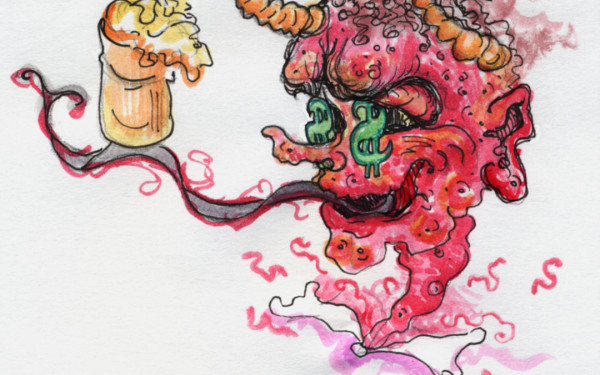Anti-Consumerism Week Coming to Concordia
Series of Different Events and Workshops Begins Next Monday
For the second consecutive school year, the Concordia Student Union is hosting Anti-Consumerism Week.
It begins next Monday, Feb. 15 and lasts all week.
Originally, the idea stemmed from Buy Nothing Day, an international day of protest against consumerism held on the last Saturday of November. Last school year, Anti-Consumerism week was a great success, said Anastasia Voutou, the CSU’s campaign coordinator, so they brought it back by popular demand.
The urbanite lifestyle in which we live no longer promotes the idea of making, fixing and re-using things. Instead, it’s all about buying and throwing away.
“We shouldn’t be consuming as much to the point of filling landfills,” Voutou said.
She stressed that society is losing the “traditional knowledge” previous generations had, an idea that Chris Bacon from the Coopérative des brasseurs illuminés, a Montreal based co-op which strives for brewing sustainability, echoed.
Both Voutou and Bacon spoke to the idea of making things yourself, of learning a craft and creating a DIY culture, where you know where your product comes from and exactly how it’s made.
The CSU organized Anti-Consumerism week in the hopes to “empower [students] with knowledge that you’re not going to get in the classroom, but that you need in your day-to-day life,” Voutou said.
The CSU is hoping that this is just the beginning of the Anti-Consumerism week, as there is “lots of expansion potential,” specifically in the technology field, said Gabriel Velasco, External Affairs and Mobilization Coordinator for the CSU.
“This is less of an ideological thing but more of a practical thing,” Velasco said. “How do we start working together in ways that aren’t destroying the planet?”
Monday Feb. 15: Paper-Making 101
Stop feeling bad about printing 200 pages worth of readings for your midterm, or making your eyes sweat looking at a computer screen for hours trying to save paper and the planet with this 100% recycled material workshop.
You’ll learn how to make your own paper and you’ll never have to agonize over it again. Learn from the ancient Egyptian tradition of paper-making and get your hands a little sticky.
The workshop starts at 3 p.m. in the seventh floor lounge of the Hall building.
Tuesday Feb. 16: DIY Home Beer-Brewing Basics
Thinking about all that PBR that you drank over the weekend—how shitty it tasted and how expensive it was?
Come to this DIY beer-brewing workshop and you’ll never have to pay for another watery beer again. Jordan Clark and Chris Bacon from the Coopérative des brasseurs illuminés will teach you their art. They’ve both been brewing beer for about four years and guarantee a good buzz in both the making and tasting process.
“It’s way cheaper than buying beer and it tastes way better,” Clark said.
According to them, you can make beer out of pretty much anything: carrots, pumpkin, beets, potatoes—but the most important part is that you make it yourself.
“It’s about not buying something that’s ready made on the shelf,” Bacon said.
The workshop starts at 3:30 p.m. in the seventh floor lounge of the Hall building.
Wednesday Feb. 17: Kombucha Making 101
Kombucha is a fermented tea drink, said to have numerous health benefits such as liver detoxification, joint care, aiding digestion and boosting the immune system.
It’s an ancient Chinese elixir that’s been around for over 2,000 years and Westerners have recently rediscovered the benefits of this fermented tea drink.
Why buy a really expensive bottle of Kombucha when you can make it yourself? It’s as easy as fermenting tea with white vinegar and a symbiotic colony of bacteria and yeast—also known as a SCOBY—which you can buy ready-made, or collect from a pre-made Kombucha drink.
The workshop starts at 6:30 p.m. in the seventh floor lounge of the Hall Building.
Thursday Feb. 18: DIY Hygiene Products
Consciously catering this workshop for a gender-neutral audience, Elitza Mitropolitska, president of Concordia Safe Cosmetics, will be demonstrating how to make body butter, lip balm and toothpaste, among other products.
“It’s very basic and simple, very easy to make and great alternatives to what’s available,” she said.
Everybody uses soap and shampoo, but most products available on the market are not good for the skin, she continued.
“It’s like feeding your skin McDonald’s instead of kale, broccoli and blueberries,” Mitropolitska said.
Instead of using harmful ingredients to the body and the environment like petroleum-based products, she’ll show how to make your own product using natural ingredients like coconut oil, shea butter and olive oil.
Mitropolitska is critical of big hygiene product brands, saying that they are more concerned with their bottom line than the quality of their products.
“They would rather pay celebrities for advertising,” she said.
The workshop starts at 6:30 p.m. in The Hive Café kitchen, room 737 in the Hall building.
Friday Feb. 19: Dumpster Diving Theory and Practice
The Concordia Food Coalition will be hosting this two-part dumpster diving workshop. The first part of the workshop will teach you everything you need to know about dumpster diving culture: how to do it, what are your rights, what to expect and even etiquette.
“If you’re dumpster diving, you’re not acting against anything,” said Loïc Freeman-Lavoie of the CFC. It’s also way to be raise our awareness of the waste that we produce on a daily basis.
“It’s not actively resisting the system, but it’s about avoiding inputting more into the system,” said Leh Deuling, who is also hosting the workshop. “We’re not tearing anything down, but we’re not building it any higher either.”
During the second part, they will take you to the Jean-Talon market to get your hands dirty and find your meal for the evening.
Part one of the workshop starts at 4 p.m. in the Hall building on the seventh floor, part two will meet inside the Jean-Talon market building at 7:30 p.m.

_900_600_90.jpg)


_600_375_90_s_c1.jpg)
2_600_375_90_s_c1.jpg)

_600_375_90_s_c1.jpg)